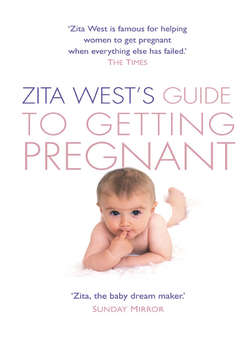Читать книгу Zita West’s Guide to Getting Pregnant - Zita WEST, Zita West - Страница 58
A Good Diet
ОглавлениеWhen you consider what sperm need to develop, and the journey they have to undertake in order to stand a chance of fertilizing an egg, it’s easier to understand why good health in a man is just as important as in a woman when it comes to making babies.
The good news is that, because of the continuous 100-day cycle of sperm production, it is possible to improve sperm’s quality relatively easily, by making the necessary health and lifestyle changes.
While the Nutrition chapter (see page 89) offers general guidelines, it is worth mentioning here, too, that when it comes to the sort of adequate nutrition that makes a difference, there is no point grabbing a general multi – vitamin, or an expensive supplement, unless you know what you’re getting and what you need. Before that, it’s worth looking at your general diet and how to improve it.
Generally speaking, the fresher and less processed the food you eat, the better. Many people advocate organic foods, and there is a good argument for this. In one Danish study, an unexpectedly high sperm count was found among organic farmers. Their sperm count was twice as high as that of a control group of blue – collar workers. But it’s tricky, because if it’s a choice between organic beans flown in from Kenya that have taken five days to get to your supermarket shelf and have then sat in your fridge for two days, and some locally – produced beans that are not organic but were picked yesterday, you might want to choose the latter, as the vitamin and mineral content of the fresher food will be higher, and washing it carefully will help remove chemical and pesticide residues.
Now is not the time to go on some extreme weight – loss diet, either. Some men opt for high – protein diets to lose weight, but we have noticed anecdotally that men following this type of diet have poor sperm. There’s evidence to show that extreme diets, like the low – carb ones in such favour these days, increase the body’s acidity if not actually leaving you malnourished, which won’t be good for sperm production. Better to adjust the balance of what you eat, increase your exercise a little, and reduce your weight that way.
Ideally, you should follow the guidelines set out in the Nutrition and Lifestyle chapters.
Try also to eat a proportion of your foods, especially fresh fruit and vegetables, raw. And when you do cook, try steaming and grilling rather than boiling or frying, which will preserve more of your food’s nutritional value.
It is probably a good idea to cut out all highly processed foods, if you can, as they are alarmingly high in hidden fats, sugars and chemical preservatives. In addition, the nutritional content of food is greatly reduced during processing. Opt for whole foods where you can.
If this feels rather overwhelming, start gradually, introducing a different change into your diet week by week as you adjust.
Water
When it comes to what you drink (and alcohol is covered separately: see page 62), make sure you are not over – doing your caffeine intake. Caffeine is mildly addictive, so if you are used to drinking a lot it may take a while to kick the habit. There is also some evidence to show that if a man has a high caffeine intake before conception, the risk of premature birth is increased. Tea contains tannin, which is less of a stimulant than caffeine, but excess quantities will deplete you of iron.
Most men do not drink enough water. Sperm need to swim!
Start changing your drinking habits first of all by increasing your water intake – most of us drink too little, generally, to be adequately hydrated.
